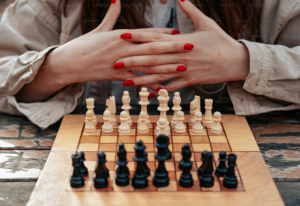Understanding the Pressure in Chess
Chess may not have physical contact, but the mental and emotional intensity it generates is unlike any other game. As a chess player, you’re constantly analyzing the board, your opponent’s moves, and your own strategies. The pressure intensifies as the game progresses, and the weight of each decision becomes more pronounced.
Several factors contribute to the pressure in chess:
1. Time Control: In tournaments, players have limited time to make each move. Rapid and blitz formats require lightning-fast decisions, while classical games offer more time but can lead to time trouble if you’re not careful.
2. Expectations: Whether you’re playing for a chess club, your school, or your country, there are expectations to perform well. Living up to these expectations can add stress.
3. Competitive Nature: Chess is a highly competitive game, and the desire to win can lead to intense pressure.
4. Perfectionism: Chess players often strive for perfection, aiming to avoid mistakes at all costs. The fear of making a blunder can be paralyzing.
So, how can you maintain your composure and perform your best under these conditions?
Caissa School of Chess has become a top choice for chess players who are starting their chess learning journey. You may want to explore their programs before deciding on your chess coach.
Techniques to Stay Calm Under Pressure
1. Preparation: One of the most effective ways to combat pressure is thorough preparation. Study openings, tactics, and endgames to build your confidence. The more you’ve practiced and understand the positions that arise, the less pressure you’ll feel.
2. Breathing Techniques: Deep, slow breaths can help calm your nerves. Focus on your breath during critical moments to regain composure and clarity of thought.
3. Mental Visualization: Before making a move, visualize the board, your pieces, and the potential consequences of your move. This mental exercise can help you stay focused and reduce anxiety.
4. Positive Self-talk: Replace negative thoughts with positive ones. Instead of dwelling on the fear of losing, remind yourself of your skills and past successes. Maintain a strong self-belief.
5. Time Management: Use your time wisely. Don’t rush through moves due to time pressure. Allocate time based on the complexity of the position. It’s better to make a thoughtful move within the time limit than to rush and make a blunder.
6. Stay in the Present: Concentrate on the current position and move rather than dwelling on previous mistakes or worrying about the future. Staying in the present moment can alleviate anxiety.
7. Body Language: Maintain a confident posture, even if you’re feeling the pressure. The mind and body are closely connected. If you present yourself confidently, it can positively impact your mindset.
8. Experience: The more games you play, the better you become at handling pressure. Experience teaches you to adapt and overcome challenging situations.
9. Analyze After the Game: Regardless of the outcome, analyze your games afterward. Identifying areas where you could have made better decisions or handled pressure differently is a valuable learning experience.
10. Seek Support: Don’t hesitate to talk to coaches, mentors, or fellow players about your feelings of pressure. They can provide guidance and support.
In the end, pressure in chess is a natural part of the game. Even the world’s best players feel it. What sets them apart is their ability to manage it effectively. By implementing these psychological strategies, you can stay calm under pressure and elevate your chess game to new heights.
If you’re looking for structured guidance to improve your chess skills, consider Caissa School of Chess. Their expert coaches can help you master techniques to stay calm under pressure and enhance your game.
Conclusion
Chess is a game that rewards strategic thinking, calculation, and composure. Staying calm under pressure is not only a psychological skill that benefits your chess performance but is a valuable life skill. Whether you’re competing in a local tournament or challenging opponents online, the ability to keep your cool will help you make better decisions and enjoy the game more. Embrace the pressure, use it to fuel your focus, and let it be a stepping stone to becoming a better chess player and a more resilient individual.
Caissa School of Chess is dedicated to helping players like you unlock their potential and thrive under pressure. Embrace the pressure, use it to fuel your focus, and let it be a stepping stone to becoming a better chess player and a more resilient individual.









